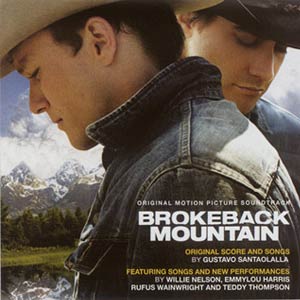Brokeback Mountain
Music composed by Gustavo Santaolalla
Featuring songs and new performances by Willie Nelson, Emmylou Harris, Rufus Wainwright and Teddy Thompson.
Available on Verve Forecast (B0005604-02)
Running Time: 43:21 (Santaolalla score running time: 15 mins)
Crotchet Amazon UK Amazon US

Few soundtracks have proved as controversial in late 2005 as the score to Ang Lee’s new western romance, Brokeback Mountain. As a director, Lee is the kind of fortunate film-maker who seems to flourish in any genre, bringing either audiences or critics (or both) to the table for his takes on the family drama (Eat Drink Man Woman, The Wedding Banquet, Ice Storm), Jane Austen adaptation (Sense and Sensibility), Civil War romance (Ride with the Devil), and martial arts epic (Crouching Tiger Hidden Dragon). Only his underrated comic book adaptation, Hulk, failed to woo either audiences or critics. With Brokeback, he successfully recaptures his critical darling status, tapping into a rich emotional vein with a story of forbidden romance kindled in the remoteness of the titular location.
Soundtracks to Ang Lee films are generally notable both for their quality as music and for their dramatic relationship to his stunning images. Previous collaborators include Mychael Danna (in two career-best scores – The Ice Storm and Ride with the Devil), Patrick Doyle (the gorgeously-romantic Sense and Sensibility), Danny Elfman (in his best superhero score, Hulk) and classical composer Tan Dun (Oscar winner for Lee’s Crouching Tiger).
Now Lee’s collaborator is Argentinian composer Gustavo Santaolalla, composer of choice for Walter Salles (The Motorcycle Diaries) and Alejandro Gonzales Inarritu (21 Grams, Amores Perros). While the caliber of the films carrying Santaolalla’s music cannot be questioned, the standalone value of the music he has written frequently comes under fire from those who feel films deserve more than music that suggests little more than mood. (I feel his best film-work to date was Michael Mann’s use of the pre-recorded ronrocco piece “Iguazu” in The Insider.)
Those who fell afoul of Santaolalla’s previous works will not be won over here, unless it is through association with Lee’s film. Santaolalla pre-recorded his score and songs for the Ang Lee film before shooting commenced – imbuing his score with the stark loneliness of E. Annie Proulx’s original short story. Fifteen minutes of the score are represented here, and it’s a stark elegiac score that in its brighter moments recalls Marty Stuart’s superior All the Pretty Horses. “Opening” is a simple melody for guitar (played by the composer), with harmonic touches for pedal steel guitar and pump organ. The same instruments outline the simple main theme for the film in “Brokeback Mountain 1”, an attractive theme with gentle string harmonies from an uncredited orchestra. The theme is repeated – with greater weight to the strings in “Brokeback Mountain 2” and “Brokeback Mountain 3”. One gets the sense of a film where music is used rarely, and the when it is used, its simplicity delivers a strong effect.
The rest is much of a muchness -“The Wings” is an upbeat finale cue that again brings to mind All the Pretty Horses, “Snow” is the kind of upbeat guitar cue you can imagine accompanying a rodeo montage, and “Riding Horses” is lovely, but barely stays long enough to make an impression before the fiddle-and-guitar hoedown “An Angel Went Up in Flames” – written by Santaolalla and performed by the ‘Gas Band’ – shatters the mood.
It’s all very nice, but one can find more of this sort of thing done better in All the Pretty Horses, or Danna’s score for Lee’s Ride with the Devil. This is no critique of the score as it serves the film – this music seems well-suited to a tale of loneliness, but one can understand when people complain that Santaolalla’s compositions don’t have nearly as much mileage away from the film as John Barry’s work for Dances with Wolves, Gabriel Yared’s work for Cold Mountain, Basil Poledouris’ score for Lonesome Dove, or even Lennie Niehaus’ similar guitar etchings for Unforgiven.
Unsurprisingly, since Santaolalla won last years Oscar for Best Original Song, the real strength here lies in the song Santaolalla co-wrote with Bernie Taupin for singer Emylou Harris, the beguiling “A Love That Will Never Grow Old”. Between that song and Rufus Wainwright’s extraordinary “The Maker Makes”, this album deserves a recommendation to those who like their songs well written. The melodies, harmonies and instrumentation have exactly that lilt that one wishes the starker score had. Less successful for this reviewer were the other songs – save perhaps Willie Nelson’s cover of “He Was a Friend of Mine”, I find myself skipping tracks.
This score may very well win the Oscar for Best Original Score this year. (At the time of writing, Santaolalla has just been nominated alongside superior writing from John Williams and Alberto Iglesias for the BAFTA Achievement in Film Music Award.) Yet while Santaolalla is a gifted musical dramatist – something his attractive score for The Motorcycle Diaries established well and truly – there is little on this album to truly merit a recommendation to the collector of film music. To those who are looking for a mature modern western with a score of compositional depth and mileage outside the film: keep looking, and chances are you’ll find you’ll find recent works by Mychael Danna (Ride with the Devil), Marty Stuart (All the Pretty Horses) and Michael Kamen (Open Range) fit the bill much more effectively than anything here.
Michael McLennan
2
Return to Reviews Index